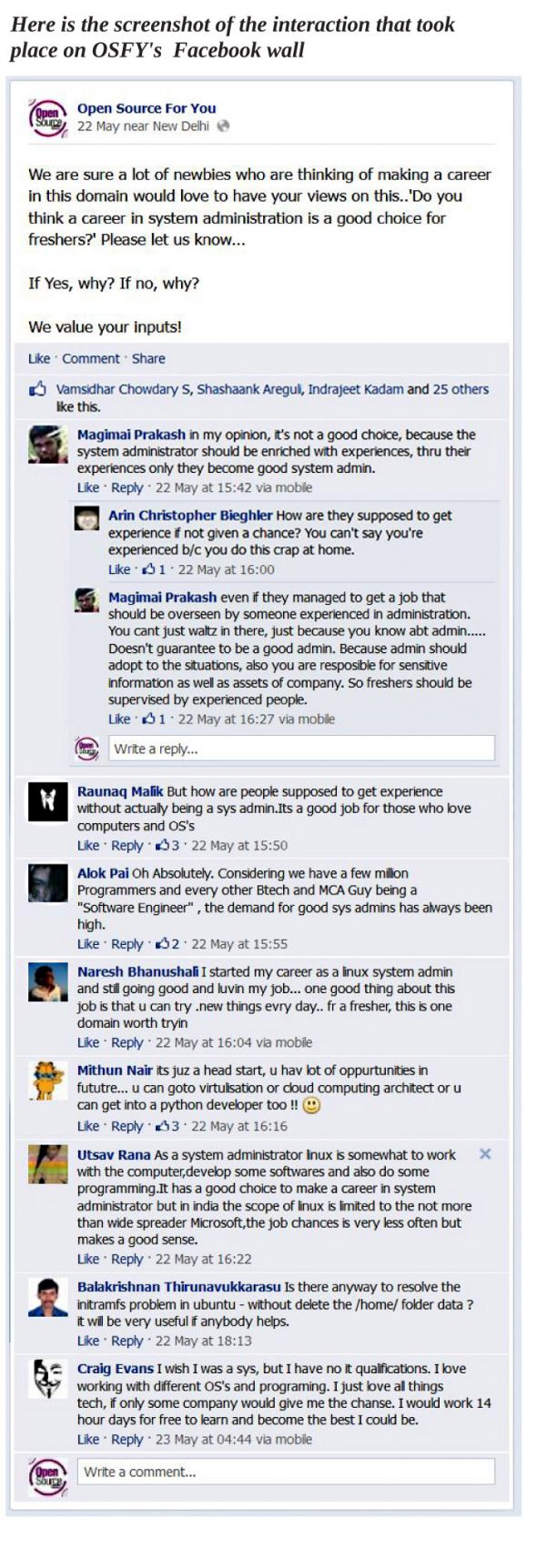With enterprises adapting newer and quicker network technologies, the demand for proficient systems administrators has been growing steadily. So, what does it take to fit the bill? OSFY gets in touch with industry experts in order to tell you more
We often find ourselves in a situation where we are working on a really important file, with the deadline looming ahead, and the computer system crashes. This is followed by adrenaline rushes, a fluttering heart, and the realisation that: ‘I should have saved the file.’ Thank God for systems administrators who fix the system when it crashes. When the system does not perform well, they tune it and when it gets obsolete, they upgrade it.
So, what exactly is the role of a systems administrator? Sysadmins play a key part when installing, supporting and maintaining the various computer systems in an organisation. Their primary tasks involve managing the servers, and ensuring the servers are backed up and that the server data is secure from unauthorised access.

Statistics reveal that job opportunities for sysadmins are expected to grow 28 per cent in the coming years, which is much faster than the average growth rate for other IT jobs. So how has the demand for sysadmins changed over the years? Shares Ramesh Gajaraju, senior manager, Information Systems, at Novell Software Development India Pvt Ltd, “Initially, there was a lot of demand for Windows sysadmins, but since the last six years there is more demand for an open kind of culture and flexible-to-learn technology. With many enterprises adopting open source technology, sysadmins with Linux skills are much in demand.”
Various recent studies also indicate that Linux sysadmins armed with the right skillsets are the most sought after IT professionals and that the demand will only grow in the years to come. While recruiting a candidate for the post of a systems administrator, there are some must-have skills that top the priority list of the hiring managers. Vibhore Sharma, chief technical officer, Naukri.com explains, “Sharp acumen and problem-solving techniques are the must-have skills for a sysadmin. Good sysadmins need to be constantly on their toes and must have the ability to resolve any IT related issue in a well-timed fashion. And the bigger the organisation is, the more systems related issues are bound to pop up.”
IT professionals with a sound technical background have a better chance of getting a job as a sysadmin. “At Novell, we prefer candidates with an engineering/diploma background. Candidates with certifications like Novell Certified Linux Administrator also get a higher preference. That apart, we look for people who have some exposure to hardware and who understand how an operating system works. We look for people with the ability to adapt to the changes happening in the world of technology and expect them to upgrade themselves accordingly,” quips Gajaraju.
Industry pundits also say that a systems administrator must ensure that the network infrastructure is stable, secure and is prepared to cope with any untoward problem. In a nutshell, a good sysadmin ensures that there are no interruptions in the functioning of a business.
And how important is prior experience in this domain? “It’s not that we do not hire freshers in our company. We pick up freshers with a good engineering background for desktop support. But when it comes to back-end server support, we look to hire experienced candidates,” says Gajaraju.
Experts believe that when it comes to systems administration, the curriculum of most of the colleges and training institutes in India is not aligned with industry standards and it’s important to bridge the gap. “I believe that the institutes should design courses keeping pace with the changing times. The curriculum should be designed in such a manner that the students passing out are industry-ready,” says Sharma.
According to Gajaraju, the average remuneration for a fresher is pretty satisfying. For experienced people, this would depend on the role and the size of the company.
The domain of systems administration makes for a promising field for open source experts. So, if you wish to get hired as a systems administrator, acquire some FOSS skills.
















































































Sys admin basic skills list
– Hardware
– Networks
– OS (Operating Systems)
– Programming, scripting
– Security
– FOSS skills (Free an Open Source Software)
– fast, continuous learning
– good, systematic problem solving skills/techniques